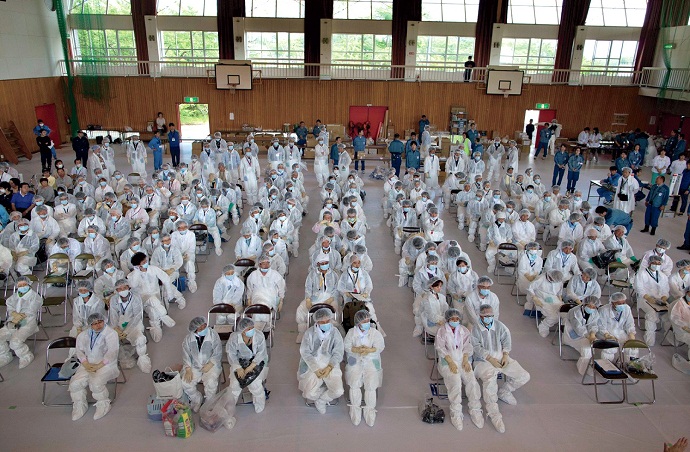
Chapter 27. Chapter 27: Nuclear Power
What are the advantages and disadvantages of nuclear power?

Guiding Question 27.5
What are the advantages and disadvantages of nuclear power?
Why You Should Care
After World War II, nuclear power generation was a new technology that was hoped would solve many problems. It would provide plentiful and safe energy generation and energy independence. Sixty years later, nuclear power plants are not as widespread as planned for a variety of reasons. The greatest argument for nuclear power is the concept of a greenhouse gas–free energy source. It has widespread use, and like renewable energy sources, it helps minimize climate change by not releasing any greenhouse gases. For this reason, it is gaining support among environmentalists and economists alike.
There are also downsides to nuclear power generation: the biggest being higher per-KwH costs, fear of reactor meltdowns and explosions, and ultimate disposal of radioactive waste. None of these problems have been solved, and after the Fukushima nuclear disaster, the fears surrounding nuclear power are once again in the public spotlight.
The future of nuclear energy could point to expansion or phasing out of the number of power plants. Either way, a long-term solution to nuclear waste disposal must be found.
1.
Which of the following is NOT a disadvantage for nuclear power?
| A. |
| B. |
| C. |
| D. |
2.
Which of the following is NOT an advantage of nuclear power compared to fossil fuel power?
| A. |
| B. |
| C. |
| D. |
3.
Injury and death rates from nuclear are lower than from fossil fuel sources. Why is nuclear power considered more dangerous?
| A. |
| B. |
| C. |
| D. |
4.
What fears would there be of any country that was expanding a nuclear power program?
| A. |
| B. |
| C. |
| D. |
5.
Thought Question: As minimizing greenhouse gases becomes more important, what value would there be in increasing use of nuclear power plants?
Short-Answer Questions
In the year following the Fukushima nuclear disaster, Japan gradually shut down all of its nuclear reactors. This removed almost 30% of Japan’s electrical generating capacity, which had to be replaced by emergency efficiency programs and a shift to increased use of natural gas and petroleum. The government is proposing a new set of stricter regulations to prevent hydrogen gas explosions, water leaks, and reactor failures like the ones that doomed the Fukushima reactors.
The challenge of restarting the reactors is not just about new safety measures. The public is now strongly opposed to restarting any nuclear reactors for fear of a repeat of the Fukushima disaster or worse. On the other side of the issue, industry wants to restart the reactors to provide much-needed electricity and ease fears of electrical blackouts slowing economic growth and development of a recovering economy.
Imagine that you are Japan's Minister of the Environment, and answer the following questions:
1) In its most recent 25-year plan, the Agency for Natural Resources and Energy planned for nuclear power production to increase from 30% to 45% of electrical production. Your ministry is tasked with the cleanup of Fukushima and is receiving much of the public attention about restarting the reactors. What could your Ministry propose as an alternative?
2) The Japanese government can restart any or all nuclear reactors without public input. What effects might this have on the public’s view of nuclear power regulation?
3) Japan was a major force behind the Kyoto Protocol to limit greenhouse gas release, and Japan’s nuclear power production was key to its future cuts in greenhouse gases. If the reactors are not restarted, what would you propose as replacement fuels that would keep Japan within its Kyoto goals?
2) Given that nuclear power has a reputation of being dangerous and mysterious, any decision that goes in the face of public opinion would be very unpopular. It would also lead to even less public trust in the value of nuclear power in the future.
3) If keeping production up without adding greenhouse gases, then continued efficiency and conservation need to be coupled with renewable energy generation. Shifting to renewable will take decades to take up 30-45%, so changes must start now with incentive programs, subsidies, or tax breaks.
Activity results are being submitted...